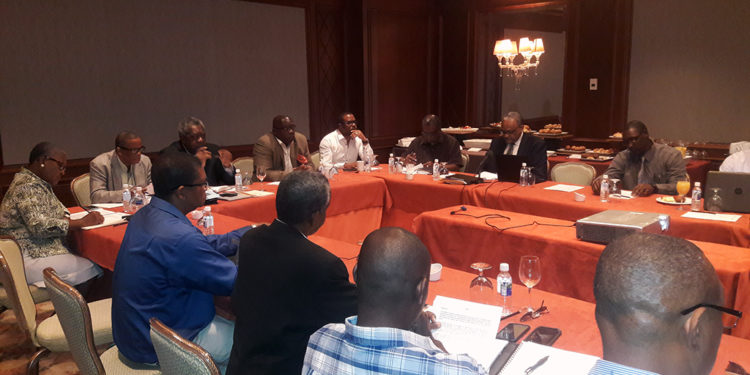BASSETERRE, St. Kitts, May 26, 2018 (Press Unit in the Office of the Prime Minister) – Several matters relating to the national security system of the twin island Federation were discussed at length on Saturday, May 26, 2018, when the National Defence Council, under the chairmanship of Minister of National Security, Prime Minister Dr. the Honourable Timothy Harris, convened its second meeting at the Four Seasons Resort on Nevis.
Joining Prime Minister Harris at Saturday’s meeting were his Cabinet colleagues the Honourable Mark Brantley, Premier of Nevis; Attorney General, the Honourable Vincent Byron, who is a member of the Defence Council; the Honourable Ian Patches Liburd and Cabinet Secretary, Mrs. Josephine Huggins.
Also present were Permanent Secretary in the Ministry of National Security, Mr. Osmond Petty, who serves as the council’s Secretary; National Security Advisor, Major General Stewart Saunders; Commander of the St. Kitts and Nevis Defence Force, Lieutenant Colonel J. Anthony Comrie, and Commissioner of Police, Mr. Ian Queeley.
The deliberations, which ran for more than five hours, saw presentations from heads of the various security agencies in St. Kitts and Nevis including the Royal St. Christopher and Nevis Police Force, the St. Kitts and Nevis Defence Force, the St. Kitts and Nevis Customs and Excise Department and Her Majesty’s Prison.
Addressing Saturday’s meeting, Prime Minister Harris stated that, “All of us who are here have something to do with the security infrastructure of the country. This then is a collaborative exercise in which we get input into the security of the state and are able to have a coordinated and coherent response to issues of national security.”
The Defence Council also heard presentations from other key stakeholders from various Government departments pertaining to the integrity of the nation’s security infrastructure.
Established under the National Defence Council Act of 2008, Council advises the Government on matters of national security, coordinate national security activities among various Government agencies, enable law enforcement and security forces and agencies of the Government to cooperate more effectively in matters involving national security, and to provide for related or incidental matters.









